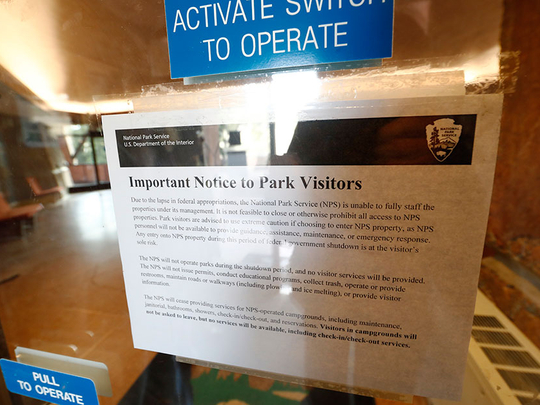
What is a government shutdown?
The US budget must be approved by October 1 every year — the start of the federal financial year. But Congress has often failed to meet this deadline and negotiations continue well into the new year, with the previous year’s funding to federal agencies extended on a temporary basis. This is the case with the US government. President Donald Trump and the US Congress failed to meet a midnight Friday deadline to pass a short-term bill to extend federal funding through to February 16, forcing some government facilities to shut down. In shutdowns, non-essential government employees are furloughed, or placed on temporary unpaid leave. Workers deemed essential, including those dealing with public safety and national security, keep working. After previous government shutdowns, Congress passed measures to ensure that all unpaid workers received retroactive pay.
How are US visa services and embassies affected worldwide?
Almost all US State Department operations will continue in a shutdown. Passport and visa processing for both American citizens and visitors, which are largely self-funded by consumer fees, will not shut down. However, the agency’s main headquarters in Washington, in consultation with the nearly 300 embassies, consulates and other diplomatic missions around the world, will draw up lists of non-essential employees who will be furloughed. Department operations will continue through the weekend and staffers will be instructed to report for work as usual today to find out whether they have been furloughed.
So what’s working and what’s not?
DEFENCE DEPARTMENT: The US military will continue to fight wars and conduct missions around the world, including in Iraq, Syria and Afghanistan. And members of the military will report to work, though they won’t get paid until Congress approves funding. Mattis said in a departmentwide memo Friday that “ships and submarines will remain at sea, our aircraft will continue to fly and our warfighters will continue to pursue terrorists throughout the Middle East, Africa and South Asia.” But Mattis said during remarks on Friday at the Johns Hopkins School of Advanced International Studies that a shutdown will still have far-reaching effects on the Defense Department. Weapons and equipment maintenance will shut down, military intelligence operations would stop and training for most of the reserve force would be put on hold, he said. And any National Guard forces heading out to do weekend training duty around the country will arrive at armouries and be told to go home.
US INTELLIGENCE AGENCIES: The workforce at the 17 US intelligence agencies will be pared down significantly, according to a person familiar with contingency procedures. The official, who was not authorised to publicly discuss the matter and spoke on condition of anonymity, said employees who are considered essential and have to work will do so with no expectation of a regular paycheck. While they can be kept on the job, federal workers can’t be paid for days worked during a shutdown. In the past, however, they have been paid retroactively even if they were ordered to stay home.
HOMELAND SECURITY DEPARTMENT: A department spokesman said nearly 90 per cent of Homeland Security employees are considered essential and will continue to perform their duties during a government shutdown. That means most Customs and Border Protection and Transportation Security Administration workers will stay on the job, according to the department’s shutdown plan, dated Friday. Immigration and Customs Enforcement will be staffed at about 78 per cent, meaning more than 15,000 of the agency’s employees will keep working. The Secret Service, also part of Homeland Security, will retain more than 5,700 employees during the shutdown.
NATIONAL PARKS AND MONUMENTS: The Interior Department said national parks and other public lands will remain as accessible as possible. That position is a change from previous shutdowns, when most parks were closed and became high-profile symbols of dysfunction. Spokeswoman Heather Swift said the American public — especially veterans who come to the nation’s capital — should find war memorials and open-air parks available to visitors. Swift said many national parks and wildlife refuges nationwide will also be open with limited access when possible. She said public roads that already are open are likely to remain open, though services that require staffing and maintenance such as campgrounds, full-service rest rooms and concessions won’t be operating. Backcountry lands and culturally sensitive sites are likely to be restricted or closed, she said. Yet the shutdown had an instant impact on two of the world’s top tourist destinations: the Statue of Liberty and Ellis Island. The National Park Service announced that both New York sites would be closed “due to a lapse in appropriations.” The park service said the closure of the Statue of Liberty National Monument and Ellis Island was effective immediately and until further notice. For ticket refunds, visitors were instructed to contact the Statue Cruises company that runs ferries to the statue and Ellis Island, the historic entry point in New York Harbor for immigrants to the United States that is now a museum.
IRS: A shutdown plan posted on the Treasury Department’s website shows that nearly 44 per cent of the IRS’ 80,565 employees will be exempt from being furloughed during a shutdown. That would mean nearly 45,500 IRS employees will be sent home just as the agency is preparing for the start of the tax filing season and ingesting the sweeping changes made by the new GOP tax law. The Republican architects of the tax law have promised that millions of working Americans will see heftier paychecks next month, with less money withheld by employers in anticipation of lower income taxes. The IRS recently issued new withholding tables for employers. But Marcus Owens, who for 10 years headed the IRS division dealing with charities and political organisations, said it’s a “virtual certainty” that the larger paychecks will be delayed if there’s a lengthy government shutdown.
JUSTICE DEPARTMENT: Many of the nearly 115,000 Justice Department employees have national security and public safety responsibilities that allow them to keep working during a shutdown. Special counsel Robert Mueller’s team investigating Russian meddling in the presidential election will also continue working. His office is paid for indefinitely.
The more than 95,000 employees who are “exempted” include most of the members of the national security division, US attorneys, and most of the FBI, Drug Enforcement Administration, Bureau of Alcohol, Tobacco, Firearms and Explosives, US. Marshals Service and federal prison employees. Criminal cases will continue, but civil cases will be postponed as long as doing so doesn’t compromise public safety. Most law enforcement training will be cancelled, per the department’s contingency plan.
TRANSPORTATION DEPARTMENT: More than half — 34,600 — of the Department of Transportation’s 55,100 employees will continue working during a shutdown. The bulk of those staying on the job work for the Federal Aviation Administration, which operates the nation’s air traffic control system. Controllers and aviation, pipeline and railroad safety inspectors are among those who would continue to work. But certification of new aircraft will be limited, and processing of airport construction grants, training of new controllers, registration of planes, air traffic control modernisation research and development, and issuance of new pilot licenses and medical certificates will stop.
—Agencies












